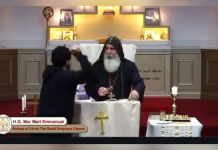Who am I?
In the musical adaptation of Les Miserables, there is a poignant scene with the protagonist, Jean Valjean. The former convict, now freed, is trying to come to grips with his past and the potential of his future. In a case of mistaken identity, a man has been arrested whom the authorities think is Jean Valjean. But if he reveals his true identity, he potentially loses everything he has built since his release from prison. The scene culminates with a brilliant song entitled, “Who am I?” in which he says, “Can I conceal myself for evermore? Pretend I’m not the man I was before? And must my name until I die, be no more than an alibi?”
It is no understatement that we live in a time where Anglicans are struggling with their identity. There is a veritable alphabet soup of Anglican jurisdictions, all of which claim in some manner, to be the “true” expression of Anglicanism. Yet, the theologies espoused around the Anglican world are not cohesive. In fact, they vary greatly and fundamentally with one another in significant ways. Like Jean Valjean, it seems Anglicans and Anglicanism itself is struggling with the question of “Who am I?”
I have wrestled with this question personally for a number of years. Raised in a high church Anglican setting, it wasn’t until seminary that I learned of other faithful (and some not so much) expressions of Anglicanism. Studying the history of the Anglican Churches, which admittedly is messy, one begins to see the diverging threads of churchmanship and theology. I have good friends on the Anglo-Catholic end of the spectrum who tend to pull almost exclusively from the Oxford Movement and the pre-Reformation English Church for their theology and praxis. I have other friends who look toward the Puritans, Calvin, and the continental reformation as the touchstone of their views. But is there another way? Is there something unique about the Anglican way that runs deeper and is more foundational?
The Foundation of the Formularies
The truth is, Anglicanism does indeed have its own ethos and that ethos is found in the formularies of the Anglican Church: The Articles of Religion, the Ordinal, the Book of Common Prayer and the Homilies. Unfortunately, for at least two generations of Anglicans, particularly in the West, these have been deemphasized and often supplanted by non-Anglican (or at least pseudo-Anglican) opinions. I believe the answer to the question of “Who am I?”, as an Anglican, it is found in these formularies. These documents outline the clear distinctive identity of the Anglican Church—that which set it apart from both the Roman Catholic Church and certain elements of the Reformation.
The Articles of Religion, relegated to the “Historical Documents” of the prayer book I grew up using, outline many of these ideas. From basics such as the Trinity and the Incarnation to the authority of Holy Scripture, the Articles root us in basic orthodox, biblical Christianity. But they also address distinctives in theology regarding free will, good works, the Church, and the sacraments. Many of the controversies of our day, particularly between parties vying for the title of “True Anglican” are eloquently and definitively addressed.
The Ordinal addresses the all-important question of the ministerial priesthood within Anglicanism. While not as radical a move as some Reformation bodies, there is a definitive shift away from the medieval doctrines of the priesthood (which necessarily has an effect on sacramental theology as seen in the Articles). The great J.C. Ryle noted, “The Reformers brought the office of the clergy down to its Scriptural level.”[1] The emphasis is on the preached word and manner of life of the minister—a change greatly needed in the 16th century and, in fact, today.
The 1662 Book of Common Prayer is widely regarded as the standard of the Anglican prayerbooks. In it, theology of the Anglican Church is expressed in its various liturgies and prayers. In many ways, the 1662 Book of Common Prayer are the Articles expressed in the prayers of the Church. The emphasis on Scripture, the understanding of justification, and renewal of sacramental theology find their common and accessible expression for the people.
Finally, we have the Homilies. Originally composed in two volumes, these sermons were designed, as Lee Gatiss, the head of the Church Society has said, “to introduce a biblically-starved people to doctrinally-healthy teaching in their own language, such as they had never experienced before in a regular and systematic way.”[2] In these homilies we see the theology of the Church expressed in a call to praxis. They are the natural outworking of the English Reformation articulated in a call to put theology to work in our daily lives.
Conclusion
The question of authentic Anglican identity is not an impossible question to answer. It need not draw unnecessarily from other traditions be they Roman or Presbyterian. The Anglican Reformers themselves have given us a strong, unique, and thoroughly Anglican vision of the Christian faith that is rooted in the Bible, theologically cohesive, historically informed, and evangelically minded. This vision is expressed in the formularies of the Anglican Church.Our modern struggle to find our Anglican identity is much closer and clearer than many people imagine. I believe the hope for the Anglican Church and for us Anglican Christians is to root ourselves once again in the formularies of Anglicanism. This hope is not based simply on a desire for a cessation of the constant arm-wrestling among Anglicans, but on the conviction that clarity on these points will free us from internal struggles so that we can boldly proclaim the Gospel of Jesus Christ to the world.
The Very Rev. Chris Findley is Rector of St. Patrick’s Anglican Church in Murfreesboro, Tennessee. He also serves as Dean of the Nashville Deanery in the Anglican Diocese of the South (ACNA). He and his wife Sheryl have three children, Aidan (20), Evan (18) and Caelyn (9).
1 Ryle, J.C., Distinctive Principles for Anglican Evangelicals, Church Society, London, 2014, 38
2 Gatiss, Lee Ed., The First Book of Homilies, Church Society, London, 2021 Edition, 9-10










